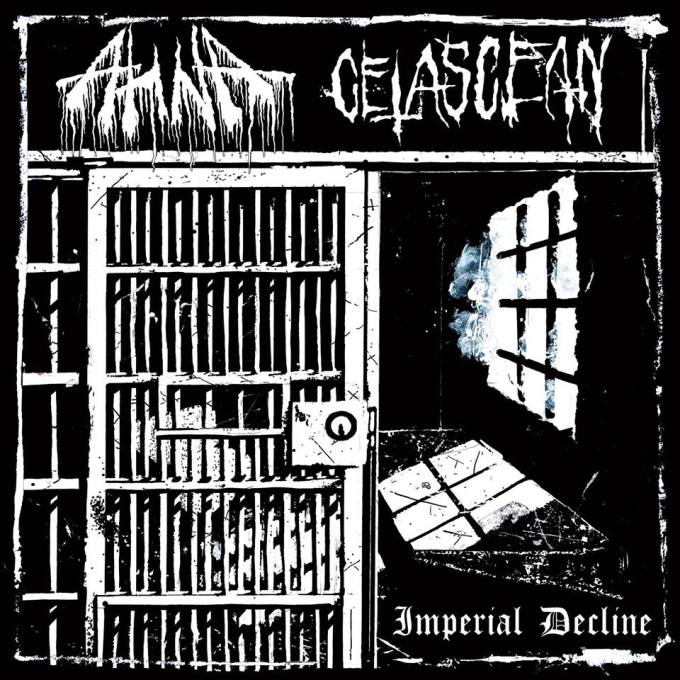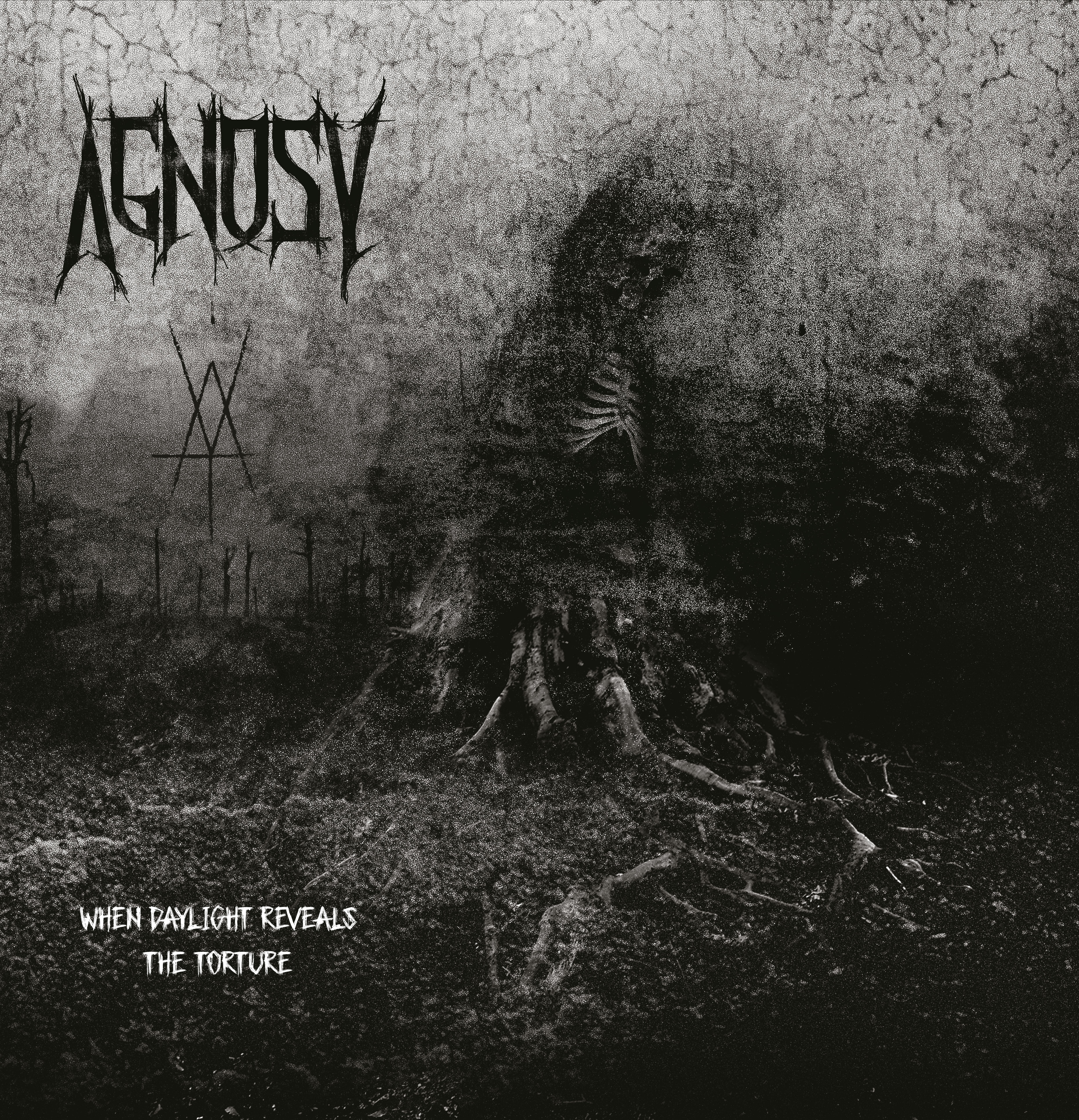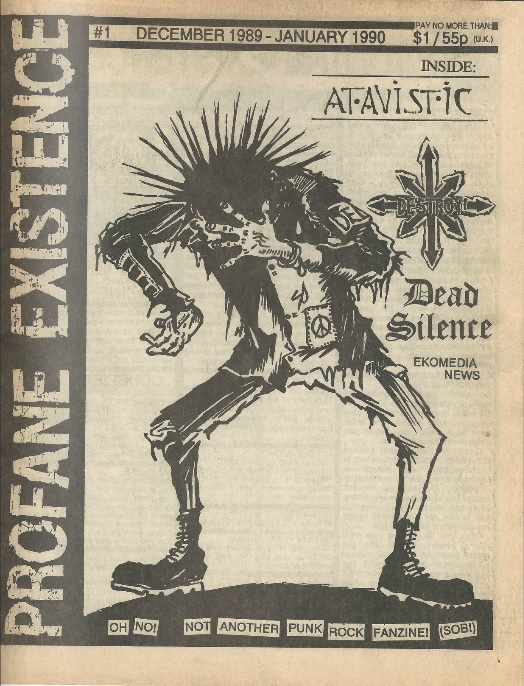
AHNA are a force to be reckoned with, combining elements of sludge metal, grind, death metal, crust, with a heavy dose of anti-authoritarian politics.They have never fallen into any trend or relive-the-past nonsense. AHNA are truly doing their own thing, making a hell of a lot of noise, and keeping it super real. Profane is proud to be a part of their new split 12″ with Winnipeg crusties CETASCEAN. To celebrate this new record, Damien Inbred sat down and had an email exchange with AHNA drummer/vocalist Anju.
First off, can you give me a bit of the history of AHNA?
We started as a two piece doing doom-drone and later had Graham on bass, Anju on drums, and a vocalist for a bit doing primitive doom stuff. We decided to go back to being a two piece and take on vocal duties ourselves and wrote our demo “The Confederation of the Cult of One” which led to our first record (s/t) that we also just recorded among ourselves. We have been a band for about 6 years and our focuses as musicians and writers has grown and changed throughout those years, with right now it just being an obsession with a variety of crust, old school death metal, primitive black metal, and other stuff in that realm. We basically just try to execute the ideas in our heads as best as possible and obsessively work on it. This might be why we started playing music together, we are both really committed and constantly work on music pretty much every single day. And I think this is also why it might seem that our music is often evolving or changing, since we are always challenging ourselves to do what we are inspired by. There is rarely a time when we are not writing.
Right now Graham and I write all of the music and lyrics and that’s fine for writing and even recording, but we feel that being just a two piece is really limiting in terms of what we can do live. Traditionally, we have always played all instruments on our records ourselves and Graham and I would do all guitar etc.. overdubs, but live it would be challenging to do what we managed to achieve in studio. Now Graham has moved onto playing lead guitar and we have a bass player (Derek) and a second guitar player (Taylor) to try to get a sound that is as close to what comes out on our records as possible for when we play live. The people we have playing with us are our friends and the lineup might change from tour to tour based on who is available for what tour or recording and this lets us continue with the level of commitment we both have while getting some help live and in the studio from friends who are stoked and wanna do that stuff with us. On this split with CETASCEAN, our friend Taylor played bass on the recording which meant that Graham could focus on guitar and then guitar overdubs and it was definitely way less pressure and allowed for more interesting guitar parts to come out. Having a third person record with us was a totally new approach and it worked well. It was great to have him there and he will be playing 2nd guitar on our LP and Derek will be on bass.
Aside from the split 12″, what releases do you have coming out in the near future?
We have a split 7″ with raw d-beat punks CONTORTURE from Sweden that is later than expected, but should be arriving any day now. We also have a split 10″ with Canadian gore-grinders G.O.D (GROTESQUE ORGAN DEFILEMENT), and then we will be recording out next full length LP that we hope will be out in time for our tour in late July. A Danish label is also going to be doing a Discography cassette of our stuff in Denmark ideally for when we get there for our tour.
You did a tour of Europe last year with ISKRA – how did that come about? What was the tour like? What were some of the positives and negatives?
ISKRA are good friends of ours and we wanted to tour with a band that was like minded so we all talked about it and it happened. As a band they are incredible to watch, night after night they played crushing sets. They are one of our favorite bands going right now and I believe they act with integrity and their music shows their sincerity and dedication. Everyone in that band is great as people and Wolf (guitarist) is someone who I respect and have learned a lot from. The tour was long and we had a total of 2 days off in 45 days or something and it went really well. The best part of that tour was watching our friends play to receptive crowds every night and having the chance to see them over and over. It seemed that people all over Europe really appreciated ISKRA and of course it’s the best feeling when you see your friend’s bands do really well. It’s hard to pinpoint any negatives, I guess not having any time off sucked but the idea that tour is a vacation is a misleading concept that even after many tours we have to remind ourselves is not the case. That said we wouldn’t be able to handle not playing music for longer than a few days very well anyway, so the lack of time off isn’t a huge deal for us. It’s hard to find negatives on a tour when we already spend our regular life playing music everyday, taking work out of the mix is the only real change and that’s always awesome.
What are some of the differences that you’ve noticed between touring in Europe, and touring in North America?
We haven’t toured the US yet due to a criminal record but Canada versus Europe is quite different. First the music we make seems to have stronger communities all over Europe. Smaller cities in Europe have a longer history of DIY squats and venues where that seems to be rare and newer in Canada. Quebec is probably the best province for that stuff here. And of course when planning a Europe tour we can tell our bandmates that they will probably be fed, get some drinks and a decent place to sleep whereas in Canada that mostly only happens when you plan ahead or know people. This all said, touring Canada is important to us since we now have a lot of friends and a strong community across the country. And especially since a lot of our friends and punks have moved to spaces off the grid, we visit and remind ourselves that there are options to live without being a wage slave.
Vancouver has long had a vibrant and active punk scene of all stripes. Where does AHNA fit into the Vancouver scene?
We have a strong connection to a lot of different bands and communities in our city. Genre is not the defining point of how we participate since we appreciate punk and metal from a variety of genres and perspectives. We have a strong community of friends in bands in and around the city including ISKRA, HAGGATHA, HOOPSNAKE, MASS GRAVE, COOKED AND EATEN, FAMINE, SIXBREWBANTHA, OSK, WAR HERO, OBACHA, SHOOTING SPREE, CHAPEL, RADIOACTIVE VOMIT, KOSZMAR, HYPEREMESIS, POOR FORM, and so many more. Just based on that abbreviated list it’s clear that what’s happening here is really diverse, and so it’s hard to say where we fit in when we participate in a lot of it. It’s kind of a small scene so it’s crucial to support everything from raw punk to grindcore to black metal to crust if you’re into it, otherwise that shit dies out and then there’s nothing interesting left in the city. People in bands in our community tend to end up at shows you might not expect to see them, because people are supportive across genres. And obviously we have a lot of respect for our friends bands that we play with who have been keeping punk/underground metal going in this town for 10+ years like MASS GRAVE, ISKRA and HAGGATHA and I think that helps keep punk “vibrant and active” as you described it here, or “alive and thriving” as someone has described it in town before, ha.
Since we both also do harsh noise we also have a strong connection to local projects like THE RITA and RUSALKA as well. As a drummer, Anju’s main influence was Matt Wood (HAGGATHA/BISON) from when she first saw GOAT’S BLOOD years ago and that really totally started a path to where we are now. Now she takes a lot of influence for drumming from Nick (BAPTISTS), Brett (MASS GRAVE), Goat (EXPRESSION OF PAIN) and Bina (CAMBODIA). There is a lot of dialogue between musicians in Vancouver because we all love what we do. MITOCHONDRION is another local band that is slightly outside of the community we usually connect with but their originality and unique approach has inspired us though we end up with a different sound in the end. Of course close neighbours being Kamloops, we have a strong connection to bands like BRIDGEBURNER, SKUFF, CHANGE and also a new anarcha-feminist space in Kamloops called The Femme For All Collective which is run by Athena, Freja and Sian, all of whom now play in bands. It might be easier to ask how we fit in the BC punk community rather than just Vancouver since it’s pretty much impossible for our band to separate ourselves from the influence and relationship we share with Squamish, Kamloops, and Victoria.
Is there much of an anarchist punk scene in Vancouver these days?
We strongly support anarchism and play fundraisers with our band and our other bands and harsh noise projects often. All of the bands in our community may not identify explicitly as anarchists or political bands but the people involved all have an interest in maintaining a non oppressive community. People like Brett from MASS GRAVE, and Dave Mccrea from OSK have always shown me a lot of support and respect as a female drummer in a predominantly male dominated genre. Tommy Wilson who runs fastcore fest has traditionally supported politically focused bands like RAPE REVENGE and opens up that dialogue within the fastcore community by attempting to bridge those gaps. I bet these people may not even be aware of the importance of their subtle contributions. That said, we don’t have a unified specifically political punk scene here but I don’t believe that labelling something makes it more legitimate. If you listen to bands like SIXBREWBANTHA’s lyrics you will definitely find strong political ideas, though they do not identify specifically as a political band. So, I guess I would say that while we don’t have a labelled anti-oppression community in Vancouver, it’s happening and co-operation between people with slightly different viewpoints and perspectives is important to us.
Aside from AHNA, are you involved with any activist or political organizing?
We have been/are part of a couple projects that are focused on expressing anti-oppression ideas in punk and underground music by running physical spaces or events. The newest project is a radical space that is opening in the city in early March. We support political organizing in the city by working in collaboration with groups who are interested to have our band or projects play or contribute in a specific way.
Where did the idea for the split with CETESCEAN come from? Will there be a tour to coincide with the split?
We are about 27 hours away from Winnipeg and yet both of our bands have made efforts to tour back and forth between one-another’s cities and play together. This created a strong friendship and we have influenced each other’s bands in the process as well. I don’t remember exactly how it happened when the decision was made to do the split, but it made absolute sense and it seemed to be at a good time while we are taking a break to record a few records before our next tour. They are an incredible band and we have a great personal relationship with all of the members.
We are not touring together to support the record, but we will be going to Kamloops and Edmonton on March 21st/22nd to play with CETASCEAN and HEAD HITS CONCRETE, and then doing a record release show in Vancouver on March 28th. We are touring ourselves on the way to the ROAR festival in Montreal in August and then we will head to Europe in late August to tour starting with a festival in Denmark. Our tour dates are approximately late July to early October and go from Vancouver to East Canada and then to Europe and back.
The split with CETESCEAN is called “Imperial Decline”. Who came up with the title, and what does it mean in the context of this record?
It’s hard to remember who exactly came up with it, but i’m pretty sure it was collaborative between the bands. The themes that both of the bands are interested in relate to the title directly, which is that people and systems in power are fucked. Both of our bands have had lyrical themes about oppression, genocide, and treatment of humans by other humans on other records as well. The title seemed fitting to sew the two sides of the record together.

On this split with CETESCEAN, what subject matter do the songs tackle?
The first track War Games is about a person at the top of the colonial food chain. Master of War was another title we were considering for this track, and it might explain some the ideas behind the lyrics. The song is comparing the war mongering person’s role to someone playing a chess game and not thinking about the lives they destroy, only ever thinking about it as a game because they never have to deal with any consequences.
The second song, Massacre describes the use of “total war” as a common tool in colonizing efforts throughout history in many countries. Graham was especially inspired by a particular event in a biography he was reading about Goyahkla (Geronimo) when writing these lyrics in which it was described how the army would wait until the men were out hunting and go in and slaughter all those who were unlikely to be able to fight back. There is also General Custard and the massacre at Wounded Knee. American history made this man a hero for going in and slaughtering woman children the sick and the old. The last lyrics are about the soldiers marching on to glory but actually marching on to their own massacre like the one at Little Big Horn. “March on brave soldier your penance awaits…..”. When we wrote about hell and penance we were talking about the reality of the payback that is due for such cowardly acts: the violence that begets violence and the nightmare of retribution.
The third song (Death Sentence) specifically uses anecdotes from victims and observers of the effects of the use of White Phosphorous by the American army on Iraqi civilians in Fallujah. The chemical would burn its victims and cause incredible pain, suffering, and damage. In the lyrics the “rain of fire” refers to a common description made by residents of Fallujah of the day that the US army dropped WP on the city. The vision of the chemical dropping was described as being surreal and horrifying, and the aftermath showed that the only function the chemical had would be to torture, harm, and destroy. Most of the victims were civilians, many of whom were unable to evacuate the city in time before the chemical assault. Many of the victims were children. The lyrics don’t focus only on this particular event since they are a more general description of the use of fucked up weapons like this, but images and descriptions from Fallujah have stuck with us and were used in the lyrics.
Check out AHNA at http://ahnadroneviolence.blogspot.ca/






























 Apologies for the lack of an episode last week. I was sick and not really feeling the whole “talking to my computer while suppressing the urge to vomit” thing.
Apologies for the lack of an episode last week. I was sick and not really feeling the whole “talking to my computer while suppressing the urge to vomit” thing.


